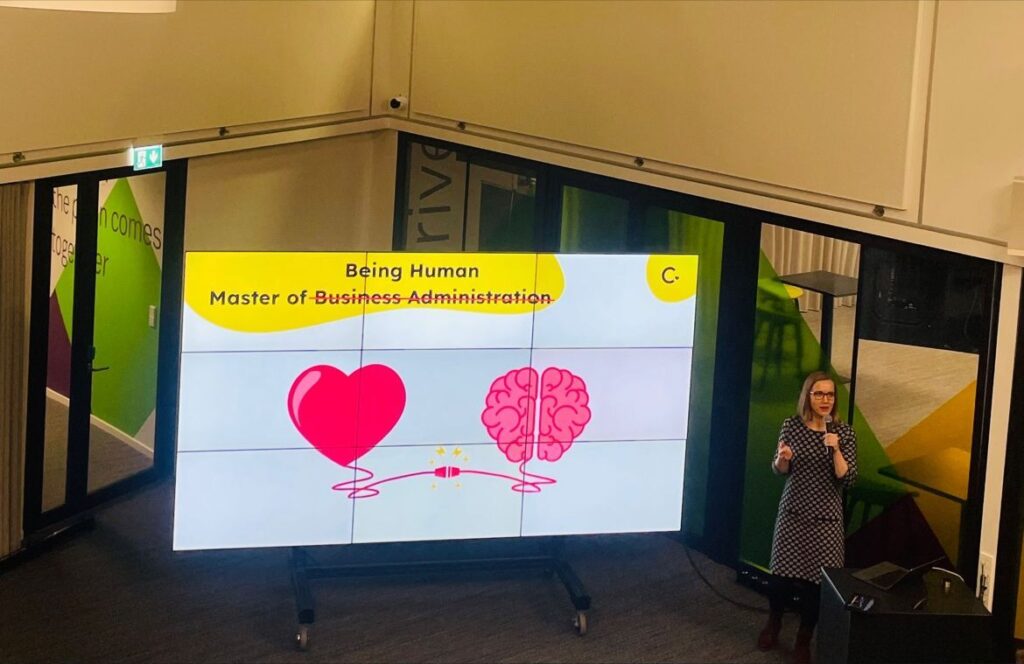November marks the birth of Cohorts, a freelance network of HR professionals whose aim is to elevate the standards of people management. We celebrated it by holding seminars focusing on topics close to our hearts One of them was Leadership that is especially dear to our HR expert Kerli. Here’s a summary of her presentation.
—

Before you continue further, please take a moment to reflect on a recent memorable experience or a moment you’ve had with your leader.
What made it stand out positively for you? Was it related to their technical skills? Or was it how they behaved in a situation, showed care, and inspired you?
I bet that it was the latter.
“We don’t need more leaders with an MBA, we need more leaders with an MBH – Master of Being Human” – Ian McDermott
Tõlge: “Meil ei ole vaja rohkem juhte MBA-ga, meil on vaja rohkem juhte MBH-ga – Inimeseks Olemise Magister“
In today’s fast-paced, technology-driven world, it’s easy to lose sight of the human element in leadership. Leaders are often celebrated for their strategic thinking, financial acumen, and competitive achievements. However, the essence of leadership transcends these qualities.
The essence of an MBH lies in understanding and embracing the full spectrum of human emotions and motivations. It is about recognizing that at the heart of effective leadership is not just the prowess to make strategic decisions or analyze complex problems but the ability to connect, understand, and inspire people. At the heart of every business decision, project, or innovation lies the profound impact on human lives.
Know Thyself
The journey to an MBH begins with self-awareness. Understanding your own ‘Why,’ what drives you, and how you manage your emotions, is critical. Leaders who are in tune with their own motivations are better equipped to guide others and make decisions that align with their core values.
Understand Your People
A leader with an MBH exhibits positive curiosity about their team members. They invest time to know who their people are, how they are doing, and what drives them. This understanding fosters a work environment where individuals feel valued and understood, leading to higher engagement and productivity.
Empathy, Emotional Intelligence, and Vulnerability
Empathy and emotional intelligence (EQ) are at the core of the MBH. These qualities allow leaders to connect with their team members on a deeper level, build trust, and create a sense of safety and gratitude in the workplace. Vulnerability, often seen as a weakness in traditional leadership paradigms, is a strength for an MBH leader. It is through showing their true selves that leaders can forge genuine connections and foster an environment of mutual respect and understanding.
Resilience( determination )
Resilience, or the ability to bounce back from setbacks, is crucial. An MBH leader views challenges as opportunities for growth, demonstrating to their team how to face difficulties with grace and determination.
Intentional Influence
Leaders with an MBH understand the power of intentional influence. They are aware that their actions and behaviors have a significant impact on their team’s culture and motivation. By consciously modeling positive behaviors, they can inspire change and foster an environment where everyone is encouraged to be their best self.
So, where to start?
For leaders aspiring to develop their MBH, here are some practical tips:
- Reflect regularly: Take time to understand what drives you and how it aligns with your leadership style.
- Prioritize relationships: Regularly take time with your team to build relationships. Share, bond, and recognise achievements. Set aside time for regular one-on-one meetings where the agenda is driven by the team member, not just you as the leader.
- Practice active listening: Make a conscious effort to listen more than you speak, ask thoughtful questions, notice their reactions, seeking to understand before being understood. Be present both in your mind and in your body.
- Embrace empathy:Look at the situation from your team members’ perspective (put yourself in their shoes),). especially in challenging situations.
- Lead with vulnerability: Share your own challenges, personal stories of failure and learning experiences. This not only humanizes you but also encourages a culture where mistakes are seen as growth opportunities.
- Be open to feedback: Encourage and genuinely consider feedback from your team, as it is crucial for growth. Seek feedback actively rather than wait for it to be offered.
- Lead by example: Model the behaviors you wish to see in your team, demonstrating integrity, resilience, and empathy.
As workplaces gradually shift their focus towards prioritizing these human-centric leadership qualities, it is evident that the journey is far from over. Yet, each step taken towards embracing an MBH philosophy is a step towards creating more humane, resilient, and effective leadership.
Leaders who master the art of being human not only achieve greater professional success but also contribute to creating more meaningful and supportive environments where people feel valued, understood, and motivated.
What is the one meaningful step that you could do to further your MBH journey? What will you commit to doing differently starting today?
